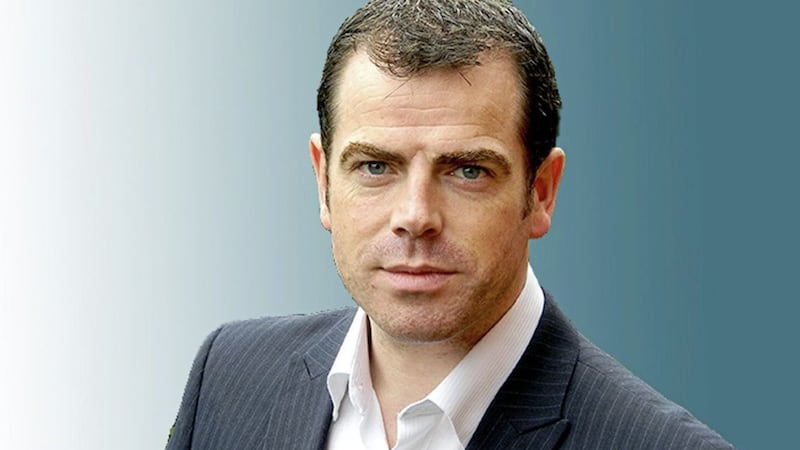I’m wondering whether Patrick Kavanagh might someday shut the gates of heaven on Brett Kavanaugh and send him back to school.
Not over their shared imperfections with alcohol. Not over their differences on politics. Not even for having an orphan ‘u’ in the Irish family name. (Though that’s a capital offence in some townlands.)
Instead, Ireland’s long dead, oft-struggling, ploughman poet from Inniskeen would likely slam the pearly gates against President Trump’s current Supreme Court nominee over a more fundamental matter.
For Patrick Kavanagh spent a lifetime crystallising the emotional essence of love through timeless honeycombed words that still today drip-feed our deepest feelings.
Whereas Brett Kavanaugh represents a modern ethos in which the human currency of love is daily belittled to a word ploy in a cynical political play.
Kavanaugh has appeared before Senate hearings recently to assess his fitness as a potential US Supreme Court judge.
If appointed, Kavanaugh’s outlook and age would see the court’s constitutional decisions shift to the right for a generation, reversing many key liberal policy trends in the US. Policy matters.
But arguably, the even more profound outcome – illustrated by Kavanaugh’s hearing last week – is that his elevation could see social vitriol and anger being intensified through a divisive public discourse that devalues the true meaning of words.
Kavanaugh is facing allegations that he sexually assaulted women when he was a young man. Alcohol is an issue. Evidence is circumstantial. Credibility is being tested. The FBI is conducting a focused inquiry. The outcome awaits.
One might imagine this is a moment for calm, clear-headed, thoughtful and judicious leadership (as one might expect on the US Supreme Court)? Instead, Kavanaugh’s personal temperament at last week’s hearing was volatile, angry and extremist.
There was no sign of empathy, no self-awareness, no sophistication of engagement, no invitation to good sense, no collaboration towards common ground, and - crucially – no calming words to bind wounds.
From Kavanaugh’s perspective, his attitude may feel appropriate. But his basic global ‘defence’ was summarised by one of his supporters, Republican Senator Orrin Hatch, who said: “His clerks love him. His students… love him. His colleagues love him.”
‘Love’. Really? Hundreds or thousands of people ‘love’ this one man? How is that possible? What is the modern US definition of ‘love’? Is it a ‘heart’ clicked on Facebook, or a ‘like’ marked on Twitter? Or the digital dots in messages?
Is love a concept that even exists in the fabric of modern American society? Or in modern Ireland? Do we even understand so many of the words that we each toss around everyday – particularly the most important, like love?
Even more bizarrely, President Trump declared on Saturday that he and North Korea’s dictator Kim Jong Un have now “fallen in love”.
Meanings have lost meaning.
Through a glass of Writer’s Tears (ironically), I wondered what Patrick Kavanagh’s old ghosts would make of it all, listening quietly in their corner booths off Baggot Street or in tea-rooms near Trinity.
Fortunately we know Kavanagh’s view on love, its wondrous meaning, its limitless depth, its centrality to the heartbeat of human existence. Because on this date in 1946 one of Ireland’s greatest literary gifts was born. Kavanagh’s poetic lyrics for ‘Raglan Road’ were first published in the Irish Press.
It’s hard to conceive a more tangible exploration of human tenderness in Irish verse, such an oceanic exhibition of empathy: love with loss; hope with heartache; passion with naivety; feelings of affection that mirror the vulnerability of our heart’s greatest fears, the autumnal image of grief as “a fallen leaf”.
“When the angel woos the clay, he’ll lose / His wings at the dawn of day.”
Gifts like Raglan Road are eternal proof that we constantly require the mystic wanderings of poets in today’s unsteady world to counter the relentlessly divisive dogma that now marks much politics.
We need to seize Martin Luther King’s “fierce urgency of now” in ploughing our own spiritual selves, turning over new ground into which explorations of love – interpersonal and inter-communal – can start to seed and grow.
We need to recapture the word ‘love’ more powerfully, unfolding its fuller meanings and implications in our lives. The more we give love its true voice, the more it speaks to ethics, values and choices – not to propaganda. Love unveils authenticity.
So here’s hoping Patrick Kavanagh is ‘doin’ the door’ at heaven’s gates on the day Brett Kavanaugh eventually demands entry, decades from now.
For the Monaghan ploughman poet could then order the Yale graduate judge to go join the back of a very long queue that stretches away down Raglan Road, and he might just learn something.








